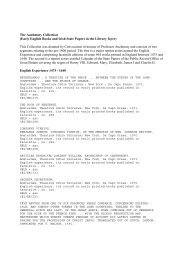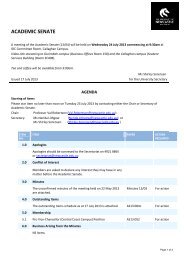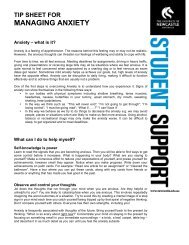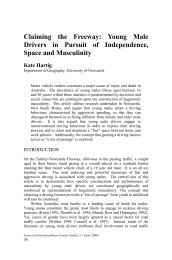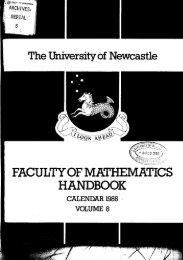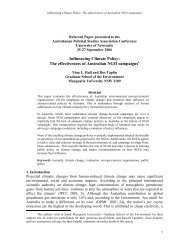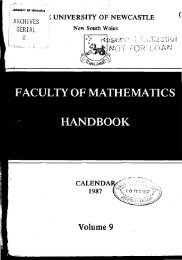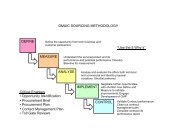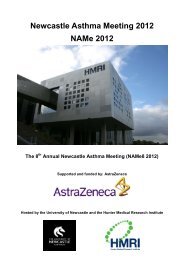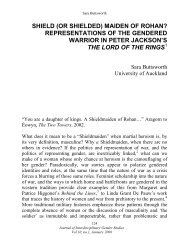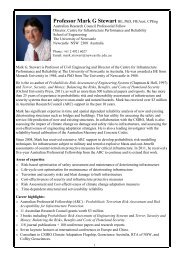n - University of Newcastle
n - University of Newcastle
n - University of Newcastle
You also want an ePaper? Increase the reach of your titles
YUMPU automatically turns print PDFs into web optimized ePapers that Google loves.
I?~tperatives are :-<br />
Come here-kqma-kowa, yual Leave it alouk-bal or wanja<br />
Go on-@ti Listen-aih-nih<br />
Get up-hap Take care-garrodjin<br />
Go away-watto Stay, remain-nannip<br />
Tenses.<br />
1. 2izclic. present.-For this, use either the infinitive or the form<br />
<strong>of</strong> the present participle ; as, gaclj o clj inni g, ' I see '; but<br />
ganya bumawin, 'I am beatmg.'<br />
3. hzclic. p.eterite.-Use the past participle, 09, add -ga to the in-<br />
finitive ; the relative clistance <strong>of</strong> the past periocls <strong>of</strong> time is<br />
indicated by prefixing to the tense the words gori, 'just now,'<br />
karam'., ' a short time since,' gorah, ' a long time ago.'<br />
3. In.dic.fictu9-e.-Here the first and second personal pronouns<br />
singular become gad.j nl and 11' y un clul, ' I will,' ' you mill.'<br />
The distance <strong>of</strong> the future time is inclicated by placing before<br />
the verb the aclverbs burcla, 'presently,' mcl mila for ally<br />
more remote time.<br />
4. Imperative 9,toocl.-Lay emphasis on the last vowel <strong>of</strong> the<br />
present indicative.<br />
5. Participle present.-Add -in or -win to the infinitive.<br />
,, pnsf-Add -ga to the infinitive.<br />
6. Pasi;ive voice.-Here the form <strong>of</strong> t.he sentence is elliptical;<br />
therefore gany a, ginui are used wit11 the past participle and<br />
the ablative <strong>of</strong> the instrument or cause.<br />
DECLENSION OF A TRANSITIVE VERB.<br />
Buma, 'to beat,' 'kill,' 'blow as a fiower!<br />
Injinite-Buma. Part. yres.-Bumawin.<br />
Part. past.-Bumiga.<br />
Tense 1. "bumawin. 1'. 2. *gori bumiga. T. 3. iburda buma<br />
T. 4. bnma.<br />
These numbers indicate the Tenses as shown above.<br />
*The pronouns to be used here are:-Sing. ganya, ginni,<br />
bal; Plz~r. galata, n'yurag, balgun; but instead <strong>of</strong> ganya<br />
and ginni, T. 2. takes gadj o and nyuildo ; there use the forms<br />
gacljul, n'yundul.<br />
Passive Voice.-For the passive voice, use the same tense-forms<br />
as in the active voice, that is, buma for theyres. and the fut.,<br />
and bumaga for the past, but prefix to them the nccusative cases<br />
<strong>of</strong> the personal pronouns ; thus, ga n y a-i n go r i bum i ga, 'I was<br />
THE DIALECT OF W. ACSTBALIA. 55<br />
beaten lately'; lit., ' (some one) beat me lately.' Brit the ablative<br />
<strong>of</strong> the cause or instrument may also be usecl to form a passive<br />
voice; thus, ganya gicljial dtanniga, 'I am pierced by a<br />
spear.'<br />
TJhe substantive verb.-There does not appear to be any<br />
copula ; it is certainly not usecl in such sentences as gaily a<br />
yulap, 'I am hungry'; ginni kotyelara, 'thou art thin'; bal<br />
windo, 'he is old7; galata gmabba, 'we are goocl'; n'yurak<br />
cljul, 'you are ~vickecl'; balgun minclait, 'they are sick.'<br />
The advc:rl~ is placed before the verb ; useful nd~-erbs are :-<br />
After (behind)-golan-ga Never-yuatjil<br />
Again-gar ro<br />
No-yuacla<br />
Allready-goi-i<br />
Always--clowir<br />
Before (in front)-gwaibagit<br />
Close to ; near-barcluk<br />
Continually-kalyagil<br />
Enough-belik<br />
Formerly-karamb<br />
Here-n'y a1<br />
How many-ilimmkn<br />
Immediately-gwaib; ilak<br />
Thus-wanno-i6<br />
Yore-gatti-gatti<br />
Not-bart; bru; yuada<br />
Now-yaii<br />
Perhaps-gabbain<br />
So-wiimirik<br />
So many-winnir<br />
Tllat way-~vunao<br />
Then-garro<br />
There (prox.)-yellinya<br />
,, (remote)-boko ; bokoja<br />
Where-xvinji ; minjal ; y aa<br />
Yes-qua<br />
Yonder-bokoja<br />
These are few in number :-<br />
After (dat.)--golag On (upon)-gaclja<br />
Among (21nl-tithe)--miincla To- -ak or -a1<br />
,, (mixed with)-karclagor With (in compaily with)--<br />
By (a&)- -il ,, gimbirn (takes the acc.) ;<br />
In (within)-bura barduk (takes the dnt.)<br />
<strong>of</strong>- -ak \~Ythout.--bm<br />
In use, they are all post-positions, and are always placed czfter<br />
the noun or pronoun. Gadj a is.usecl <strong>of</strong> one thing lying on another,<br />
but never <strong>of</strong> anything lying on the grouilcL<br />
A question is askecl by putting kannah at the encl <strong>of</strong> the sen-<br />
tence; as, n'yundo tonka, kttnnah, 'do you hear'? Ananswer<br />
may be given by clua, 'yes,' or by affixing -bi k to the word used<br />
in reply; as, yallanait, 'what is that? burnu-bik, 'it is a<br />
tree.' If the reply is negative, put bar t or b r u after verbs, and<br />
y u ada after adjectives.



